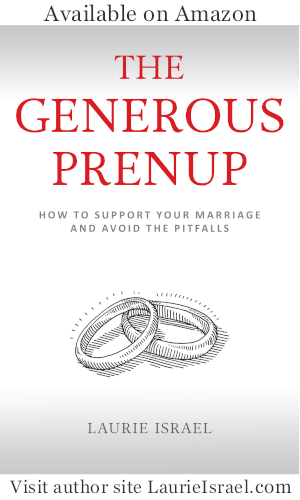By Laurie Israel
Lawyer, Mediator/Brookline, MA
In my law practice, I get a steady stream of potential clients wanting prenuptial agreements. These potential clients read about them in the media and are being told that they are crucial for someone about to be married. Some of them are being advised to get one by their accountants, business associates, lawyers, and/or family members.
 But beware. Unlike what the media reports, prenups can be very dangerous for your marital health. Here’s why:
But beware. Unlike what the media reports, prenups can be very dangerous for your marital health. Here’s why:
1. Prenups lack “consideration.”
The prenups in a first marriage are not “give and take” but “take and take.” Normally a contract is an equal exchange for value. That’s what “consideration” is. But prenups are an exception – they don’t have to have consideration. The lack of consideration in the contract will show up later when you most need it. For instance, the unfairness is evident when a divorce 30 years after the wedding, and one of the spouses (by mutual consent) has done most of the homemaking to the detriment of his or her career.
2. Prenups make you think less of your spouse.
And at their root, prenups show a lack of commitment to the marriage and a lack of faith in the partnership. The person you saw as your generous lover now shows him/herself to be selfish and uncaring. You start perceiving your partner differently, and see him/her as over-concerned about money. Ironically, the marriage becomes more concerned with money after a prenup than it would have been without the prenup. I have heard people say their marriage never recovered from the prenup.
3. Prenups are inherently unfair.
In a prenup, a party often says that he/she only shares money (such as earned income) when he or she chooses to. What if the other part is raising kids, working part-time, keeping house, and giving 100% to the marriage? One part is giving 100% to the marriage, the other isn’t. This unfairness will get to you after a value and taint your marriage.
4. Most prenups are much more extreme than they need to be.
The typical prenup says that you can disinherit your spouse if you want to. You can disinherit your spouse even if you die after a 30-year marriage and your marriage is ongoing at the time of your death. This is overreaching and unnecessary. Prenups usually do not designate an area of joint financial venture. Marriages thrive from joint venture. Prenups keep you working separately. This is deadly to a marriage.
5. Prenups provide a lifetime of bad memories.
Going through the process of getting a prenup is very difficult, entailing many meetings with lawyers and reviews of drafts. Prenups always cause tears and bad feelings at a time in one’s life that is supposed to be loving and beautiful. There is no way to say it other than the person you thought loved you wants to take things away from you. That’s what a prenup is, at the heart of it. It’s very nasty. It will always be remembered.
6. They make for a difficult situation between you and your in-laws.
Often it is the parents of the more moneyed spouse who suggest the prenup in the first place. Walking down the aisle, stripped of your marital rights, may make you feel less kindly and loving towards your in-laws.
7. They change the basic premises of what a marriage is.
A good marriage involves connectedness and sharing at every level. Finances and creating a good livelihood and security is very important to a marriage. Take that area away and your marriage will limp along. Ever hear of that adage, “money is love”? It is true in marriage – one of the ways you show your love is to be generous to your spouse with money.
8. It is the single most important contract you will ever sign in your life, and you have no idea of its implications when you sign it.
Young people getting married are in the throws love. You need to have been married for a long time to understand what marriage is. If you sign a prenup, you are signing away rights that will become very important to you in future years. And this is the single most valuable contact you will likely ever sign.
9. They encourage money manipulation and greed over sharing, openness and generosity.
Prenups define “separate property” as the property you get to keep and control during your marriage. People with prenups tend to manipulate their property during the marriage by adding to their “separate property”. By “protecting yourself” (the ostensible reason for the prenup) you have succeeded in leading to a dysfunctional marriage which is now more likely to fail.
10. People get prenups because they don’t understand that “the law” is the fairest way to come to a divorce settlement
Divorce law is there for a reason. There are as many different marriages as there are people. Divorce law is the way people are able to handle all these various factual differences and come to a fair result. And since divorce laws in states have been interpreted by court cases, in 99% of the time, a case settles without litigation. Trust the law to be fair. Prenups are inherently unfair.
So what to do if your fiancé drops the bomb on you and says, “We need a prenuptial agreement,” before you get married?
1. Educate your future spouse.
Understand that your spouse is probably simply deluded by the media reports and bad advice from friends and colleagues. Give your future spouse this article and my other articles posted on the internet to read. Go with him/her to a lawyer who can explain the rules of marriage, divorce, and inheritance to both of you. Don’t give up any rights without understanding what they are and how they might play out in a marriage of 30 years that ends in death or divorce. This information will be eye opening and demonstrate the unfairness of the prenup
2. Have a mediated prenup if you must have one.
A neutral mediator can guide you through the process by encouraging open communication. He or she can help you find a fair and reasonable coming together of aims face-to-face, not through dueling attorneys. The process will be under your control. With a good mediator, a party will feel free to say he or she doesn’t want a prenup, and that thought should and will be fully explored in the mediation.
3. Make the prenup as least restrictive as possible.
Selfishness kills a marriage. Generosity makes it thrive. Your mediator can help you make the prenup less restrictive. They can sketch out an area of financial joint venture in the marriage. If you are working with attorneys, don’t assume they will think about doing this without your asking them. Most attorneys unthinkingly use a standard scorched-earth version agreement.
Conclusion: So don’t swallow the Kool-Aid and think that prenups are the best thing for your upcoming marriage since sliced bread. In spite of the recent media blitz on prenups, it’s not true. There is no better way to destroy your marriage before it’s even started than to have a prenup. If you choose to be married, do it fairly and generously. Trust in the tradition of marriage as a sharing of everything, including finances. Trust in the law to treat both of you fairly should you decide to end your marriage.
